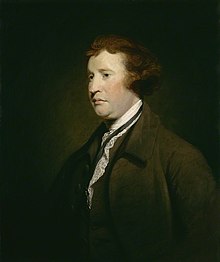Edmund Burke | |
|---|---|
 Portrait by Joshua Reynolds c. 1769 | |
| Rector of the University of Glasgow | |
| In office 1783–1785 | |
| Preceded by | Henry Dundas |
| Succeeded by | Robert Bontine |
| Paymaster of the Forces | |
| In office 16 April 1783 – 8 January 1784 | |
| Prime Minister | |
| Preceded by | Isaac Barré |
| Succeeded by | William Grenville |
| In office 10 April 1782 – 1 August 1782 | |
| Prime Minister | The Marquess of Rockingham |
| Preceded by | Richard Rigby |
| Succeeded by | Isaac Barré |
| Member of Parliament for Malton | |
| In office 18 October 1780 – 20 June 1794 Serving with | |
| Preceded by | Savile Finch |
| Succeeded by | Richard Burke Jr. |
| Member of Parliament for Bristol | |
| In office 4 November 1774 – 6 September 1780 Serving with Henry Cruger | |
| Preceded by | Matthew Brickdale |
| Succeeded by | Henry Lippincott |
| Member of Parliament for Wendover | |
| In office December 1765 – 5 October 1774 Serving with
| |
| Preceded by | Verney Lovett |
| Succeeded by | John Adams |
| Personal details | |
| Born | 12 January 1729 Dublin, Ireland[1] |
| Died | 9 July 1797 (aged 68) Beaconsfield, Buckinghamshire, England |
| Political party | Whig (Rockinghamite) |
| Spouse |
Jane Mary Nugent (m. 1757) |
| Children | Richard Burke Jr. |
| Education | Trinity College Dublin Middle Temple |
| Occupation | Writer, politician, journalist, philosopher |
Philosophy career | |
| Notable work | |
| Era | Age of Enlightenment |
| Region | Western philosophy |
| School | Classical liberalism Conservatism Counter-Enlightenment Romanticism |
| Institutions | Literary Club (co-founder) |
Main interests | |
Notable ideas | |
| Signature | |
| This article is part of a series on |
| Conservatism in the United Kingdom |
|---|
 |
| This article is part of a series on |
| Liberalism in the United Kingdom |
|---|
 |
Edmund Burke (/bɜːrk/; 12 January [NS] 1729[2] – 9 July 1797) was an Anglo-Irish statesman and philosopher who spent most of his career in Great Britain. Born in Dublin, Burke served as a member of Parliament (MP) between 1766 and 1794 in the House of Commons of Great Britain with the Whig Party.
Burke was a proponent of underpinning virtues with manners in society and of the importance of religious institutions for the moral stability and good of the state.[3] These views were expressed in his A Vindication of Natural Society (1756). He criticised the actions of the British government towards the American colonies, including its taxation policies. Burke also supported the rights of the colonists to resist metropolitan authority, although he opposed the attempt to achieve independence. He is remembered for his support for Catholic emancipation, the impeachment of Warren Hastings from the East India Company, and his staunch opposition to the French Revolution.
In his Reflections on the Revolution in France (1790), Burke asserted that the revolution was destroying the fabric of "good" society and traditional institutions of state and society, and he condemned the persecution of the Catholic Church that resulted from it. This led to his becoming the leading figure within the conservative faction of the Whig Party which he dubbed the Old Whigs as opposed to the pro-French Revolution New Whigs led by Charles James Fox.[4]
In the 19th century, Burke was praised by both conservatives and liberals.[5] Subsequently, in the 20th century, he became widely regarded, especially in the United States and the United Kingdom, as the philosophical founder of conservatism,[6][7] along with his ultra-royalist and ultramontane counterpart Joseph de Maistre.[8][9]
- ^ "Edmund Burke". Library Ireland. Archived from the original on 20 October 2017.
- ^ The exact year of his birth is the subject of a great deal of controversy; 1728, 1729, and 1730 have been proposed. The month and day of his birth also are subject to question, a problem compounded by the Julian–Gregorian changeover in 1752, during his lifetime. For a fuller treatment of the question, see F. P. Lock, Edmund Burke. Volume I: 1730–1784 (Clarendon Press, 1999), pp. 16–17. Conor Cruise O'Brien (2008; p. 14) questions Burke's birthplace as having been in Dublin, arguing in favour of Shanballymore, Co. Cork (in the house of his uncle, James Nagle).
- ^ Richard Bourke, Empire and Revolution: The Political Life of Edmund Burke (Princeton University Press, 2015), pp. 220–221, passim.
- ^ Burke lived before the terms "conservative" and "liberal" were used to describe political ideologies, cf. J. C. D. Clark, English Society, 1660–1832 (Cambridge University Press, 2000), pp. 5, 301.
- ^ O'Keeffe, Dennis (2009). Meadowcroft, John (ed.). Edmund Burke. Continuum. p. 93. ISBN 978-0826429780.
- ^ Andrew Heywood, Political Ideologies: An Introduction. Third Edition. (Palgrave Macmillan, 2003), p. 74.
- ^ F. P. Lock, Edmund Burke. Volume II: 1784–1797 (Clarendon Press, 2006), p. 585.
- ^ DeMarco, Carl (1 January 2023). "A Historical and Philosophical Comparison: Joseph de Maistre & Edmund Burke". The Gettysburg Historical Journal. 22 (1). ISSN 2327-3917.
- ^ "Book Review | Conservatism: The Fight for a Tradition, by Edmund Fawcett". The Independent Institute. Retrieved 20 April 2024.